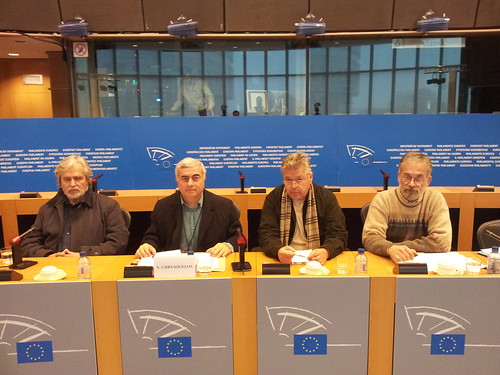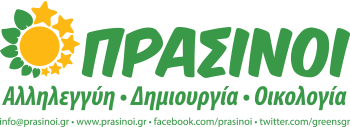An interview on gold mining in Brussels, on the initiative of MEP Nikos Chrysogelos
See the interview video:
 The social, environmental and economic consequences of gold mining in Halkidiki as well as the institutional and policy issues arising from the way the political establishment has so far handled this case, were presented by representatives of the people of Halkidiki at a press conference held Thursday, Jan. 24 in the European Parliament in Brussels, following the invitation of Nikos Chrysogelos Greek MEP (Greens in EP).
The social, environmental and economic consequences of gold mining in Halkidiki as well as the institutional and policy issues arising from the way the political establishment has so far handled this case, were presented by representatives of the people of Halkidiki at a press conference held Thursday, Jan. 24 in the European Parliament in Brussels, following the invitation of Nikos Chrysogelos Greek MEP (Greens in EP).Apostolos (Tolis) Papageorgiou said: "Greece has transferred a mining area of 317 square kilometers with a proven mineral wealth of 25 billion. The sale price was zero and mineral ROYALTIES are also zero. Therefore the rights and benefits to Greece and the EU from this mineral wealth are also zero, as it all belongs to the Canadian company ELDORADO GOLD. This whole area is a forest which holds the largest water reserves in Halkidiki. The forest and aquifers will be irreparably damaged by the activities that the mining company has already commenced in the area. All those who have caused environmental damage so far have been indemnified by law by the former Deputy Minister of Finance, while the new company that recently took over the mines has been relieved of all liability in advance even for future damages. European institutions can not tolerate such practices." Watch his statement here.
George Zoumpas said: "N,E. Halkidiki is a densely populated area and hosts a range of economic activities that are incompatible with mining. Therefore the residents' income and the jobs that will be lost will be many times more than any projected economic benefit. We are talking about the third tourist destination in Greece, with a large production of honey, olive oil, vegetables, fish, etc. We believe that the local community should have a priority in expressing its opinion on the transformation of the area to an industrial one. Not only was the local community not asked, but it is being prevented by all possible means from expressing its views. Instead of protecting the basic rights of the citizens, the Greek state though its institutions and the police is protecting the interests of a private corporation, using brutal and undemocratic methods ". Watch his statement here.
Athanasios Krommidas said: "We have a negative experience in the region as regards the environmental impact of the existing small-scale mining activity. We are now confronted with a mining project of pharaonic proportions, that far exceeds the carrying capacity of the area. According to the findings of scientific institutions (the Aristotle University of Thessaloniki, the Technical Chamber of Greece/Regional Department of Central Macedonia, the Faculty of Agriculture of the University of Thessaloniki etc.), there will be contamination of groundwater, surface water, air and land surrounding the mining activity. All this could have damaging and irreversible impact on the environment, the plants and animals and ultimately the residents' health and well-being." Watch his statement here.
Nikos Chrysogelos said: "The model of wasteful consumption, environmental destruction and collusion between economic interests and politics led the country to bankruptcy. Strengthening this model in the name of crisis is not the solution. We can not close our eyes to the impact on the environment, the local economy and society – all well documented by scientific institutions – of a gigantic project that will destroy Halkidiki and other parts of the country.
We support citizen mobilizations, having a conscious policy of solidarity that is closely connected to a new industrial policy and green economy model for the country and the region on one hand, and changes in the consumption pattern on the other. A modern industrial policy minimizes mining and non-renewable raw materials consumption and emphasizes on reducing waste of raw materials, both in the production process and consumption. There is a truly sustainable and genuinely green alternative to primary extraction of precious metals: reuse and recycling. The Belgian company Umicore is a characteristic example, which focuses exclusively on these activities, employing 14,572 people and having a turnover of EUR 14.5 billion in 2011. It extracts metals, like gold, from hazardous electronic waste, from the mountains of discarded televisions, computers and mobile phones produced by European consumers every year, while describing its own activities as "aboveground mining."
We care about alternative solutions for those currently employed in mining operations, considering at the same time that we all have an obligation to defend the interest of the region as a whole and seek fair solutions for all citizens." Watch his statement here.
- Read the documented critique on the impacts of gold mining and the residents' positions in the interview texts here and here.
- Visit the blogs http://soshalkidiki.wordpress.com and
- http://antigoldgreece.wordpress.com and social media
- http://www.facebook.com/antigold and https://twitter.com/#!/antigoldgreece
- e-mail: Αυτή η διεύθυνση ηλεκτρονικού ταχυδρομείου προστατεύεται από τους αυτοματισμούς αποστολέων ανεπιθύμητων μηνυμάτων. Χρειάζεται να ενεργοποιήσετε τη JavaScript για να μπορέσετε να τη δείτε.
- Read more about the vision and the interventions of the Greek Ecologists Greens at a national, Balkan and European level around the critical issue of mining at the new website: http://opgold.ecogreens-gr.org/











